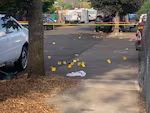Crime is a major focus for Oregon candidates looking to unseat incumbent power in the May primary, even as data shows little validity to the notion that overall crime is rising in the state.
“My first priority is addressing our growing public safety crisis,” Republican gubernatorial candidate Christine Drazan told KOIN in a January candidate survey before incorrectly claiming crime was up in communities across the state. “Yet we continue to hear calls for defunding our police.”

Republican candidate for governor Christine Drazan.
Courtesy of Christine Drazan
There is scant evidence showing a correlation between police budgets and crime rates, but several Republicans running for governor hope it is still an issue that can help them dislodge the decadeslong Democratic hold of the seat.
A sizable number of voters in Oregon see crime as a significant issue in the upcoming election.
According to a recent DHM poll of 600 people across the state, commissioned by OPB, 25% of respondents in the Portland metro area said crime is the most important issue facing Oregon. Statewide, 16% of people agreed.
Only homelessness and government/leadership ranked as higher concerns across Oregon.
What do you think is the most important problem facing Oregon today?
Source: DHM Research survey of Oregonians commissioned by OPB, overall margin of error 4%
Many of the concerns about crime across the state from candidates like Drazan – who was one of several people who declined to respond to an OPB survey sent to every gubernatorial candidate – seem to originate from one high profile statistic that is rising in Portland: gun violence.
In the Portland metro area, homicides have soared in recent years. Portland tallied 91 homicides in 2021, shattering a record set in 1987. The number of shootings in Portland has also tripled since 2019, shining a spotlight on a very violent and visible crime indicator.
Several candidates for governor in the May primary have made crime the center of their political universes, often playing up unsupported claims about out-of-control crime and police budget cuts proposed in 2020 at the height of racial justice protests, even if those cuts largely didn’t materialize.

Republican candidate for governor Stan Pulliam.
Courtesy of Friends of Stan Pulliam
“The top issue absolutely is the festering culture of criminality and mass homelessness decaying every corner of our state,” Republican candidate Stan Pulliam wrote in response to the OPB questionnaire. Pulliam is mayor of Sandy.
“There has been a massive uptick in crime and riots that we’ve watched on the nightly news, all the while politicians have slowly defunded our police with their words and actions,” he wrote.
Pulliam did not explain in his questionnaire response why he thinks there is a massive uptick in crime, but said if elected he would triple the size of the state police and use the National Guard to “clean up our streets.”
Domestically, the National Guard is used for disaster relief such as wildfires, hurricanes and the pandemic. At times, it also aids law enforcement in responding to civil unrest. It’s not clear if Pulliam’s idea of “cleaning up our streets” falls within the guard’s typical mission set.
While the increase in Portland’s homicide rate follows a similar trend across the country, many crime indicators in Oregon have remained unchanged since before the pandemic or even gone down.
Based on the Portland Police Bureau’s crime statistics, assault rates in the city have remained relatively constant since 2018 and sex offenses appear to be trending down. Burglaries and robberies increased for a few months in 2020, returned to pre-pandemic levels in early 2021 and then started to tick up toward the end of the year.
Reported assaults in Portland, by month
Some fluctuation in crime rates from year to year is typical, and it’s notoriously difficult to draw conclusions or divine long-term trends from small variations in recent data. Official crime rates are also likely incomplete since they only reflect reported incidents.
Elsewhere in the state, crime is even less of a factor.
In Salem, crime rates have held steady since before the pandemic. Police there reported nine homicides in 2019, five in 2020 and 10 in 2021. According to the Salem police department and state data, assaults and property crimes such as burglaries and robberies have remained constant in recent years.
Similar trends can be observed in Eugene and more rural parts of the state like Josephine and Wallowa counties, where crime rates have not changed significantly.
Even suburban Portland communities haven’t seen the increases in crime often touted by some politicians.
In Washington County, violent crime has remained unchanged in recent years while property crime appears to be declining. In Clackamas County, some categories of property crime have increased while violent crime has remained unchanged.
Reported assaults and property crimes in Washington County, by month
Neither of the two Democratic frontrunners — former House Speaker Tina Kotek and State Treasurer Tobias Read — mentioned crime in their responses to OPB’s survey, with both saying housing and homelessness were the biggest issues facing Oregon.
Both candidates said they agreed with President Joe Biden that police funding should be increased.
Polling suggests plenty of voters share Republican candidates’ preoccupation with crime.
Source: DHM Research survey commissioned by OPB, overall margin of error 4%
Though not supported by data, the electorate’s views on the topic may be driven in part by the very politicians seeking their vote, as well as regular messaging from police unions and organizers opposing criminal justice reformers.
George Floyd’s murder at the hands of Minneapolis police officer Derek Chauvin helped bring decades of racism and unchecked police violence to the fore. The ensuing protests, which included widespread calls to cut police budgets and reform the criminal justice system, quickly morphed into a rancorous partisan fight.
Conservatives in Oregon and across the country lept to defend law enforcement budgets and blamed Portland’s increasing homicide rate and months of racial justice protests on progressive Multnomah County District Attorney Mike Schmidt’s alleged unwillingness to prosecute crime.
In his survey response to OPB, Pulliam wrote he would federally deputize some state police to keep rioters “outside the jurisdiction of the soft-on-crime Multnomah County District Attorney.” (Oregon’s governor does not hold power to federally deputize law enforcement.)
The criticism that the DA’s office does not prosecute criminals is not supported by data. The accusation first popped up soon after Schmidt took office in August 2020 and faced a backlog of more than 500 low-level charges against protesters. He announced a policy that his office would conserve resources by not prosecuting protesters who had been arrested for city ordinance violations not involving deliberate property damage, theft or the use or threat of force against another person.

Multnomah County District Attorney Mike Schmidt
Courtesy Mike Schmidt
Of the 4,890 burglaries reported to the Portland police in 2021, police referred 481 to the district attorney for prosecution, meaning police were only able to identify and arrest a suspect in 9.8% of those cases. On average, the district attorney’s office prosecuted 70% of those referred. Police referred 22% of the 9,044 vehicle thefts reported in 2021, and the DA prosecuted about 63% of those cases.
The lack of data showing rising crime across the state has not stopped some people seeking office from playing up fears to voters. Bud Pierce, who is one of the leading Republican gubernatorial candidates and attempting his second bid for the office, made promises on his website for a new approach “to tackle Oregon’s rising rates of crime and property destruction.”
Pierce also did not respond to OPB’s candidate survey.
Portland City Council races
In Portland’s two races for city commissioner, candidates are mostly focusing on the city’s dire housing shortage, mental health care and Portland’s commission form of government, considered dysfunctional by many residents and city leaders alike.
In a survey sent to candidates for positions currently occupied by Jo Ann Hardesty and Dan Ryan, the leading challengers and the two incumbents barely mention crime as an issue of focus, save for the increase in shootings and homicides. The exceptions were Vadim Mozyrsky and Rene Gonzalez, two candidates running to Hardesty’s right and hoping to oust her from her seat.
“Out of control homelessness, skyrocketing crime, and politics devoted to special interests instead of the city and its residents are the biggest problems we are facing today,” Gonzalez wrote in response to a survey question.
Gonzalez wrote that his No. 1 priority is “stabilizing the city’s livability by directly confronting the challenges of homelessness and crime.”

In this OPB file photo, numbers mark areas where law enforcement collected bullet casings and other evidence after an Aug. 10, 2021, shooting that left two people dead and four injured in Northeast Portland near the intersection of Fremont and 82nd Avenue. Although overall crime is not up in Oregon, Portland saw record homicides in 2021.
Courtney Sherwood / OPB
Mozyrsky highlighted his experience serving on the Citizen Review Committee, the Portland Committee on Community-Engaged Policing and the Police Budget Advisory Committee as evidence he understands policing and crime in the city. He said Portland should not have disbanded the police bureau’s Gun Violence Reduction Team in 2020.
“In the midst of a skyrocketing homicide rate, City Council took away one of the main tools for dealing with gun violence, only to turn around 18 months later and reestablish a similar Focused Intervention Team,” he wrote.
The gun violence team was disbanded in response to protester demands. The team had a documented past of disproportionately policing the Black community. Critics of the decision immediately blamed the end of the team for the increase in shootings, despite data and police statements saying shootings had already been trending up for months.
Meanwhile, Hardesty said her second term would focus on continuing to expand Portland Street Response, as well as addressing houselessness, gun violence and a growing number of traffic fatalities.
Even if data doesn’t support the claim that crime is out of control across Oregon, some voters say it will influence who they pick in the primary.
Toby Stanley, a lifelong Forest Grove resident who said he hasn’t been a victim of crime himself, said he realized crime is one of the most pressing issues facing the state by watching local news. Stanley said it doesn’t matter if some types of crime are going down as long as other types are increasing so dramatically.
“If it’s not going up, I don’t care,” he told OPB. “That doesn’t excuse the fact that people are getting shot every day, business owners are being broken into, people are being allowed to steal and walk off. It’s out of control.”
After initially saying he planned to vote for one of the conservative candidates for governor, Stanley raised a third option, and a potentially big problem for candidates from both parties: a powerhouse candidate unaffiliated with a political party, who isn’t on the primary ballot this spring and won’t face voters until the November general election.
“I haven’t done all my homework yet,” Stanley explained. “But I would vote for an independent candidate, a lady by the name of Betsy Johnson.”
